
While this blog should not be construed as legal advice, we share this information after 20 years of experience in Kitsap County, Washington. Many people believe that refusing the BAC test makes a future DUI prosecution more difficult for the Prosecuting Attorney. The theory makes sense – if you take the BAC result out of the Prosecutor’s tool chest, it is more difficult to prove the case. Unfortunately, that theory does not match with legal reality in the State of Washington.
The State Can “Argue” The Refusal
When you “refuse” the breath test at the station, it is true that the State doesn’t have a result to show that an individual is over the per se limit. However, in exchange, the State now possesses something more powerful – the ability to argue the refusal.
The District Courts give the Prosecuting Attorneys wide latitude to paint the defendant who refused the breathalyzer as a menace to society. The menace to society / danger to the community label permeates through all levels of the DUI prosecution, not just before a jury at trial.
As early as a defendant’s first hearing, or “arraignment”, the State will undoubtedly mention the refusal when suggesting conditions of release to the judge. For example you will hear statements like “your Honor, as troubling as these facts are to begin with, this defendant also choose to refuse the breath test, preventing this Court from knowing how high the result was and how serious a threat this individual poses to the community.” Next, the Prosecutor will ask for an Ignition Interlock requirement due to the refusal.
The refusal is easy for the Prosecutor to prove. While the introduction of a BAC result into evidence is a precise process of many steps that must be followed in the correct order, the refusal is as easy as throwing paint at a wall. For defense counsel, it is nearly impossible to prevent the State from intruding / arguing the refusal evidence before a jury.
A Refusal Is A Sentencing Enhancement
When the Prosecuting Attorney alleges the “Refusal” on the Criminal Complaint, it is a sentencing enhancement. The sentencing enhancement increases the mandatory minimum jail time and mandatory minimum fines.
A Refusal Triggers More Severe Sanctions From The DOL
Lastly, the “refusal” triggers more severe action by the Washington State Department of Licensing. For a frame of reference, if an individual blows, the suspension is usually 90 days. Under the same set of facts, with a refusal, the suspension will be not less than one year.
People Have No Reason To Know The Negatives Of A Refusal
People aren’t educated as to the negative repercussions of the refusal. No one ever plans on being arrested for DUI, so why would you educate yourself for a scenario that you believe will never happen? To compound the issue, individuals from other states come with the belief that they need to refuse the breathalyzer because it is advantageous in their home state. Washington is an implied consent state and you will are assumed to consent to the blow if you drive on Washington roadways. If you don’t blow, you will certainly be punished more severely. If you have questions about this or any other Washington DUI related topic, please call or text our office.

Get help now
Whether you choose to handle your case alone or engage the Witt Law Group, being informed and prepared is essential. Early involvement of an attorney can significantly impact your chances of a fair recovery, allowing you to focus on healing while we handle negotiations with insurance adjusters to secure fair compensation for your injuries.




